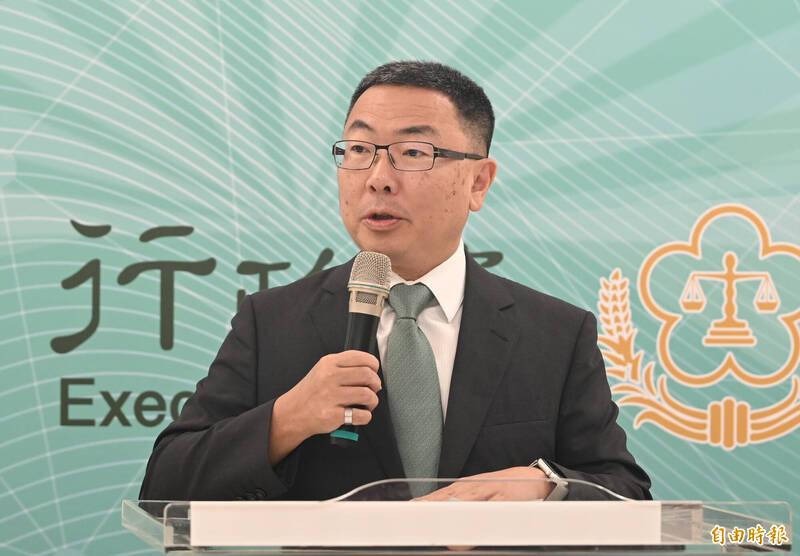The Constitution already allows for restrictions on free speech, Minister Without Portfolio Lin Min-hsin (林明昕) said today at a news conference after a Chinese-born resident left Taiwan earlier this week after her residence permit was revoked due to her alleged support of Chinese unification by force.
Article 23 of the Constitution states that all enumerated freedoms and rights “shall not be restricted by law except by such as may be necessary to prevent infringement upon the freedoms of other persons, to avert an imminent crisis, to maintain social order or to advance public welfare.”
The statement comes after Chinese-born social media influencer “Yaya in Taiwan” (亞亞在台灣), left for China on Tuesday, hours before the government could execute a deportation order issued for her “reunification” comments made on Chinese short-video platform Douyin.

Photo: Taipei Times
The National Immigration Agency earlier this month revoked Yaya’s, whose real name is Liu Zhenya (劉振亞) and is married to a Taiwanese, dependent-based residency permit and barred her from reapplying for five years before issuing an order to leave Taiwan before midnight on Tuesday.
The situation stoked debate about what constitutes free speech and what can be deemed illegal speech which incites hatred or violence.
Citizens’ rights, including the right to free speech, are protected under the law, but everyone lives in a collectivist society, not one which protects only the rights of the individual, Lin said.
The extent to which free speech may be subject to limitations depends on the specific circumstances and timing, but restrictions can be enforced as long as they align with the principles of legal reservations, legal certainty and legitimate purpose, all of which have room for debate, he added.
Limits placed on free speech must not only satisfy constitutional interpretations but meet international legal standards, including the UN’s two covenants — the International Covenant on Civil and Political Rights and the International Covenant on Economic, Social and Cultural Rights, he said.
If the Criminal Code is used to regulate free speech, it must meet the principle of legality and be defined by law as a punishable offense, he added.
If free speech is deemed to create a risk to national security, it may warrant criminal punishment or other reasonable sanctions, he said.
In the future, specific articles may be introduced to the Criminal Code or a separate law may be enacted to deal with such instances, he said.
The decision would be considered by the Ministry of Justice which would set up a taskforce to evaluate amendments to the Criminal Code, he added.
The Executive Yuan would respect the jurisdiction of the different ministries and evaluate the scope and necessity of placing restrictions on free speech, particularly concerning criminal penalties, he said.
Implementing the Criminal Code in such cases would only be used as a last resort, he added.
Premier Cho Jung-tai (卓榮泰) has said that free speech is not without limits, and once it threatens national security, even democratic countries may impose restrictions, Cabinet spokesperson Michelle Lee (李慧芝) said.

CHANGING LANDSCAPE: Many of the part-time programs for educators were no longer needed, as many teachers obtain a graduate degree before joining the workforce, experts said Taiwanese universities this year canceled 86 programs, Ministry of Education data showed, with educators attributing the closures to the nation’s low birthrate as well as shifting trends. Fifty-three of the shuttered programs were part-time postgraduate degree programs, about 62 percent of the total, the most in the past five years, the data showed. National Taiwan Normal University (NTNU) discontinued the most part-time master’s programs, at 16: chemistry, life science, earth science, physics, fine arts, music, special education, health promotion and health education, educational psychology and counseling, education, design, Chinese as a second language, library and information sciences, mechatronics engineering, history, physical education

The Chinese military has boosted its capability to fight at a high tempo using the element of surprise and new technology, the Ministry of National Defense said in the Quadrennial Defense Review (QDR) published on Monday last week. The ministry highlighted Chinese People’s Liberation Army (PLA) developments showing significant changes in Beijing’s strategy for war on Taiwan. The PLA has made significant headway in building capabilities for all-weather, multi-domain intelligence, surveillance, operational control and a joint air-sea blockade against Taiwan’s lines of communication, it said. The PLA has also improved its capabilities in direct amphibious assault operations aimed at seizing strategically important beaches,

New Taipei City prosecutors have indicted a cram school teacher in Sinjhuang District (新莊) for allegedly soliciting sexual acts from female students under the age of 18 three times in exchange for cash payments. The man, surnamed Su (蘇), committed two offenses in 2023 and one last year, the New Taipei District Prosecutors’ Office said. The office in recent days indicted Su for contraventions of the Child and Youth Sexual Exploitation Prevention Act (兒童及少年性剝削防制條例), which prohibits "engaging in sexual intercourse or lewd acts with a minor over the age of 16, but under the age of 18 in exchange for

The High Prosecutors’ Office yesterday withdrew an appeal against the acquittal of a former bank manager 22 years after his death, marking Taiwan’s first instance of prosecutors rendering posthumous justice to a wrongfully convicted defendant. Chu Ching-en (諸慶恩) — formerly a manager at the Taipei branch of BNP Paribas — was in 1999 accused by Weng Mao-chung (翁茂鍾), then-president of Chia Her Industrial Co, of forging a request for a fixed deposit of US$10 million by I-Hwa Industrial Co, a subsidiary of Chia Her, which was used as collateral. Chu was ruled not guilty in the first trial, but was found guilty